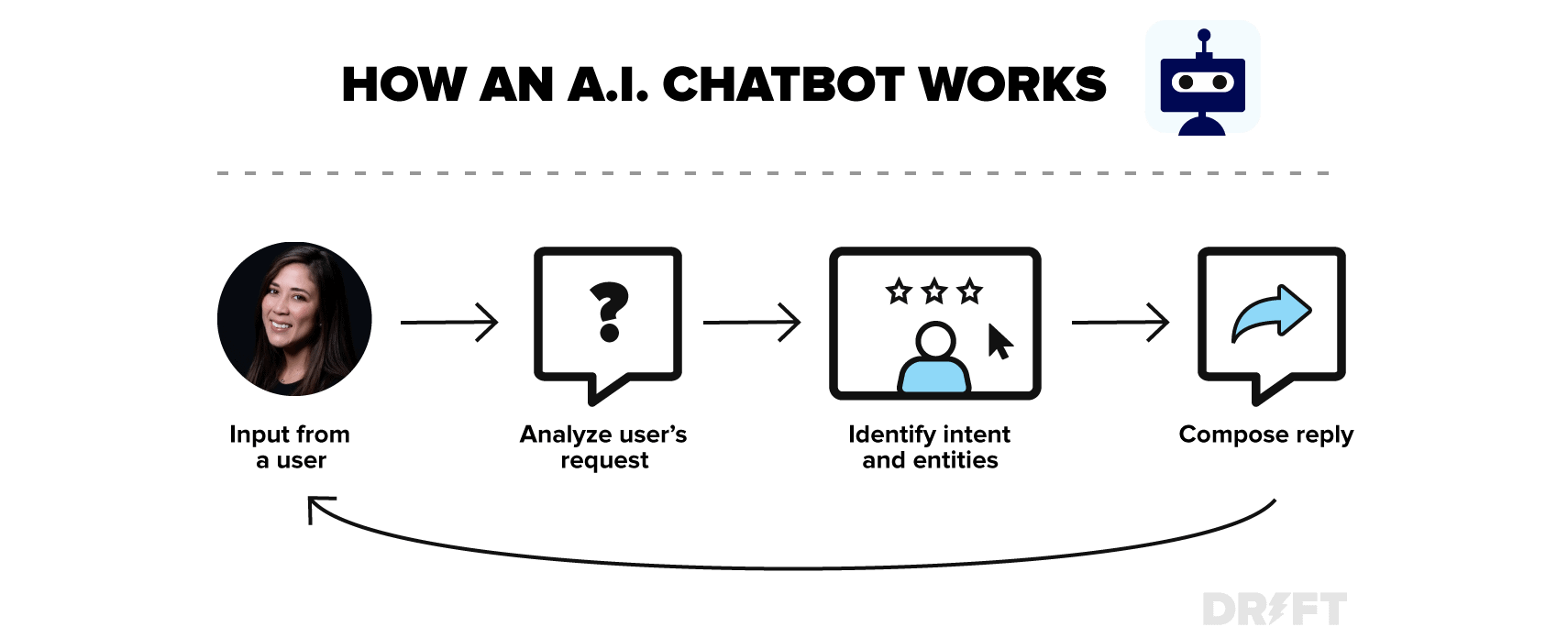In this digital age, artificial intelligence (AI) chatbots have become increasingly popular. But what exactly is an AI chatbot? Simply put, it is a computer program that uses AI to simulate conversation with human users, often through text-based interfaces.
AI chatbots are capable of performing a wide range of tasks, from answering customer inquiries to providing personalized recommendations. They are becoming an integral part of many businesses and organizations, as they can save time and money while improving customer satisfaction. Whether you are a business owner or simply curious about the world of AI, understanding what an AI chatbot is and how it works can be a valuable resource.
An AI chatbot, or artificial intelligence chatbot, is a computer program that uses artificial intelligence technologies such as machine learning and natural language processing to simulate human conversations. These chatbots can be programmed to provide customer service, answer frequently asked questions, or even carry out transactions. They are often integrated into messaging platforms or websites to provide a more personalized and efficient user experience.

What is an AI Chatbot?
An AI chatbot, also known as an artificial intelligence chatbot, is a computer program designed to simulate conversation with human users. These chatbots use natural language processing (NLP) and machine learning algorithms to understand and respond to user queries, allowing them to converse with users in a human-like manner. AI chatbots can be used in a variety of applications, such as customer service, personal assistants, and even for entertainment purposes.
How do AI Chatbots Work?
AI chatbots use a combination of natural language processing and machine learning algorithms to understand and respond to user queries. When a user types in a query, the chatbot uses NLP algorithms to analyze the text and determine the user’s intent and context. The chatbot then retrieves the appropriate response from its database and delivers it to the user.
One of the key advantages of AI chatbots is their ability to learn from previous interactions. As users interact with the chatbot, it collects data on their queries and responses. The chatbot then uses this data to improve its responses over time, making it more accurate and effective in its interactions with users.
Types of AI Chatbots
There are several types of AI chatbots, each with its own unique features and capabilities. Some of the most common types of AI chatbots include:
- Rule-based Chatbots: These chatbots are programmed to follow a set of predefined rules and responses. They are limited in their ability to understand user queries that fall outside of their programmed rules.
- Contextual Chatbots: These chatbots use machine learning algorithms to understand the context of user queries and provide more accurate responses.
- AI Assistants: These chatbots are designed to provide personalized assistance to users, such as scheduling appointments or providing recommendations based on user preferences.
- Messaging Chatbots: These chatbots are integrated into messaging platforms, such as Facebook Messenger or WhatsApp, allowing users to interact with them directly through these platforms.
Benefits of AI Chatbots
AI chatbots offer several benefits to businesses and users alike. Some of the key benefits of AI chatbots include:
- 24/7 Availability: AI chatbots can be available 24/7, allowing users to get quick and accurate responses to their queries at any time of day.
- Cost Savings: AI chatbots can help businesses save on customer service costs by automating routine tasks, such as answering FAQs or scheduling appointments.
- Personalization: AI chatbots can provide personalized assistance to users, such as recommendations based on user preferences or previous interactions.
- Efficiency: AI chatbots can handle multiple queries simultaneously, making them more efficient than human customer service representatives.
AI Chatbots vs. Human Customer Service
While AI chatbots offer several benefits, they are not a replacement for human customer service. There are several key differences between AI chatbots and human customer service that businesses should keep in mind:
| AI Chatbots | Human Customer Service |
|---|---|
| Consistent responses | Varied responses based on individual customer service representatives |
| 24/7 availability | Limited availability based on business hours |
| Can handle multiple queries simultaneously | Can only handle one query at a time |
| Cannot handle complex queries or emotional responses | Can handle complex queries and emotional responses |
In conclusion, AI chatbots are a powerful tool that businesses can use to improve their customer service and provide personalized assistance to users. While they offer several benefits, they are not a replacement for human customer service and should be used in conjunction with human representatives to provide the best possible service to customers.
Frequently Asked Questions
How does an AI chatbot work?
An AI chatbot is powered by artificial intelligence and machine learning algorithms that enable it to understand and interpret user input. It uses natural language processing (NLP) to understand user queries and respond with appropriate answers. The chatbot can be trained with different sets of data to improve its accuracy and relevance over time.
Once a user interacts with the chatbot, it analyzes the input and responds with relevant information. The chatbot can also be programmed to perform specific tasks, such as booking a hotel room or making a reservation at a restaurant, based on user requests.
What are the benefits of using an AI chatbot?
One of the primary benefits of using an AI chatbot is that it can provide immediate responses to user queries, regardless of the time of day. This can help businesses improve customer service and save time and resources. AI chatbots can also be programmed to handle repetitive tasks, freeing up employees to focus on more complex tasks.
Another benefit is that AI chatbots can be used to gather valuable data about user behavior and preferences. This data can be used to improve the chatbot’s performance and to inform business decisions.
What are some common use cases for AI chatbots?
AI chatbots can be used in a wide range of industries and applications. Some common use cases include customer service, e-commerce, healthcare, and finance. In customer service, chatbots can help businesses handle large volumes of inquiries and provide immediate responses to common questions. In e-commerce, chatbots can be used to guide shoppers through the purchasing process and answer questions about products.
In healthcare, chatbots can provide patients with information about symptoms and treatment options, and in finance, chatbots can help customers manage their accounts and provide investment advice.
What are the limitations of AI chatbots?
While AI chatbots have many benefits, there are also some limitations to consider. One limitation is that chatbots may not always understand user input correctly, especially if the language is complex or ambiguous. This can lead to frustration for users and may require human intervention.
Another limitation is that chatbots may not be able to handle complex tasks or provide personalized responses. In these cases, human interaction may be necessary to provide a satisfactory outcome.
How can businesses implement AI chatbots?
Businesses can implement AI chatbots in a variety of ways, depending on their specific needs and resources. One option is to use a chatbot platform that provides pre-built templates and tools for creating and customizing chatbots. Another option is to build a custom chatbot using in-house developers or third-party contractors.
Regardless of the approach, it is important to train the chatbot with relevant data and to test it thoroughly before launching it to the public. Regular updates and maintenance are also necessary to ensure that the chatbot continues to function effectively over time.
In conclusion, an AI chatbot is a computer program designed to simulate conversation with human users. It uses natural language processing and machine learning algorithms to understand and respond to user queries. These chatbots are becoming increasingly popular in various industries, from customer service to healthcare and banking.
The benefits of using AI chatbots are numerous. They can handle a large volume of inquiries simultaneously, provide 24/7 support, and reduce response time. They also improve customer satisfaction and engagement by providing personalized and timely responses.
However, it is important to note that AI chatbots are not perfect and still have limitations. They may struggle to understand complex queries or emotions, and there is a risk of them providing inaccurate or inappropriate responses. Therefore, it is crucial to evaluate and monitor their performance regularly.
Overall, AI chatbots are an exciting development in the world of technology and have the potential to revolutionize the way we interact with machines. With further advancements in AI technology, we can expect to see even more sophisticated and intelligent chatbots in the future.

